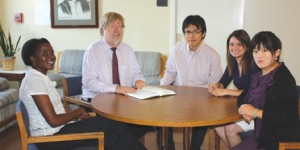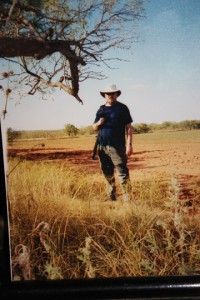Meet Clyde F. Martin: A Man on a Mission
Amy Munice
Clyde F. Martin (ASA Fellow and elected member of ISI, among many other credits) is a man on a mission.
-
He’ll need many cellphones to succeed in his quest …
More importantly, he’ll need an army of like-minded statistics PhDs to live and work in Africa, helping to turn raw data into information that will help transform crop insurance into a truly workable program capable of staving off famine in Sub-Saharan Africa. The landscape there is not much different from Lubbock, where Texas Tech University is and where Martin has taught for more than 30 years. Farmers in West Texas, however, grow cotton and have a deep bench of agricultural scientific insights at their disposal to succeed. Not so in Africa, a fact that Martin has become acutely aware of during his tenure this past year as one of the State Department’s Jefferson Science Fellows.
Little more than a year ago, Martin gave Africa’s challenges in developing a functional crop insurance program not much more than passing thought. That was before he applied and won the Jefferson Fellow Award to work with the U.S. State Department and get the break from decades in academia he sought. Martin recommends the Jefferson Fellowship program to others, and if his experience is an indicator, expect your life to change.
Martin recounts his experiences and current focus, saying, “I’d advise anyone thinking of applying to be a Jefferson Fellow to not expect that you are going to be doing math or statistics all the time. Because you are trained in statistics, you are trained to think, and, more importantly, statisticians are trained to interact with other disciplines. At the State Department, I interacted with diplomats. Your job as a Jefferson Science Fellow is not to answer questions as much as point out that there is a need for data and a scientific approach to understanding problems. For example, there is now a plant disease called Coffee Rust in Costa Rica, and as scientists and statisticians, we point out that we need to have data on weather, temperature, [and] precipitation [that] are changing and creating conditions for the dominance by this pathogen. I now have a student at Texas Tech looking into this problem …
“… The organization I’ve been working with this past year is Feed the Future. It involves 17 countries, with the majority in Africa. There is not one thing that needs to be done to make sure that people don’t die of hunger, but rather many things that need attention. … My key focus has been on taking a look at the limitations of indexed insurance in the African context and how to modify it to make it more acceptable to small holders there.
“The problem is that indexed insurance has been based on rainfall (i.e., if rainfall is less than X millimeters, then everyone who has insurance is paid, and if it is more than Y, then nobody is paid), with graduated payments correlated to rainfall. One of the reasons that doesn’t work is that there are many reasons why farmers might lose their crops other than the weather. Plant diseases, locusts, and other insects are just some examples where a weather index doesn’t cover the loss.
“What I’m hoping is that we can expand the coverage to cover all the catastrophic losses. Logistically, it is impossible to do verification of every single claim. These are small farms, and the total amount of insurance might be $700. You can’t afford to send an insurance agent out to inspect every field, so there has to be some other mechanism to measure catastrophic losses and to get the money to the farmers at the time when the harvest would usually take place. If we can’t solve this problem, nobody will want to buy the insurance …”
Martin continues, “There is widespread agreement that a program is needed. One of the major obstacles is that we don’t have good data on what is happening in those rural areas throughout Africa. There are cellphone networks that are now being used to deliver information to farmers about prices and market and matters related to disease prevention. We could potentially also collect data via cell phones, but this data will be messy and not very accurate. With proper statistics, however, we could make realistic estimates of crops and deliver insurance before the crop is due. Insurance depends on information—if your information is good, you have potential for good insurance. … Voids in information cause premiums to be higher than they otherwise would be, and this works against the viability of an insurance program.”

Martin, flanked by his PhD students. From left: Nothabo Dube, Zimbabwe; Clyde Martin; Masaki Ogura, Japan; Kendal Gillies, United States; and Yulei Pang, China
Martin is juggling many routes and options for making these African crop insurance programs work. One possibility he is considering is the equivalent of a Fulbright Program to bring African students to the United States for studies in agricultural statistics with the requirement that they go back to Africa to write their dissertations.
Martin comments, “The World Bank had one very successful program using cell phones for data collection, and we are looking at how to use their experience in the design of a solution to the crop insurance problem. What we had hoped to do was get a pilot project in the next few years and verify that it can be done. … Actually, we know it can be done, but we just need to know more about the hoops you need to jump through to get data properly analyzed. … For example, it’s estimated that 90% of rural people in Africa have cellphone access, but very few have smart phones, and if we had those with apps, it would make data collection far easier.”
Talking to Martin, you get the strong sense that he will get this job done one way or another. Although Martin is quick to say he’ll work on this until “someone better comes along, and they always do,” you only have to glance at his lengthy CV to see that making progress on difficult problems has long been his calling card. For example, he co-authored a paper about Kawasaki Disease that showed low dose aspirin treatment was just as successful as high dose, but with fewer complications. He also led a study of the 1987 measles epidemic at Texas Tech University showing that the epidemic was stopped when the immunity rate exceeded 98%. He has helped pen more than 400 refereed books, reports, and papers on diverse topics ranging from helicopter autopilot design, to irrigation techniques for cooling potatoes, to a current book on geometric tools for statisticians.
It’s likely that Martin’s many other projects will need to be put on the back burner for a bit. Martin says, “I went from zero to all-consuming” when it comes to wielding statistics to fight famine.
Martin is a man to watch.


















